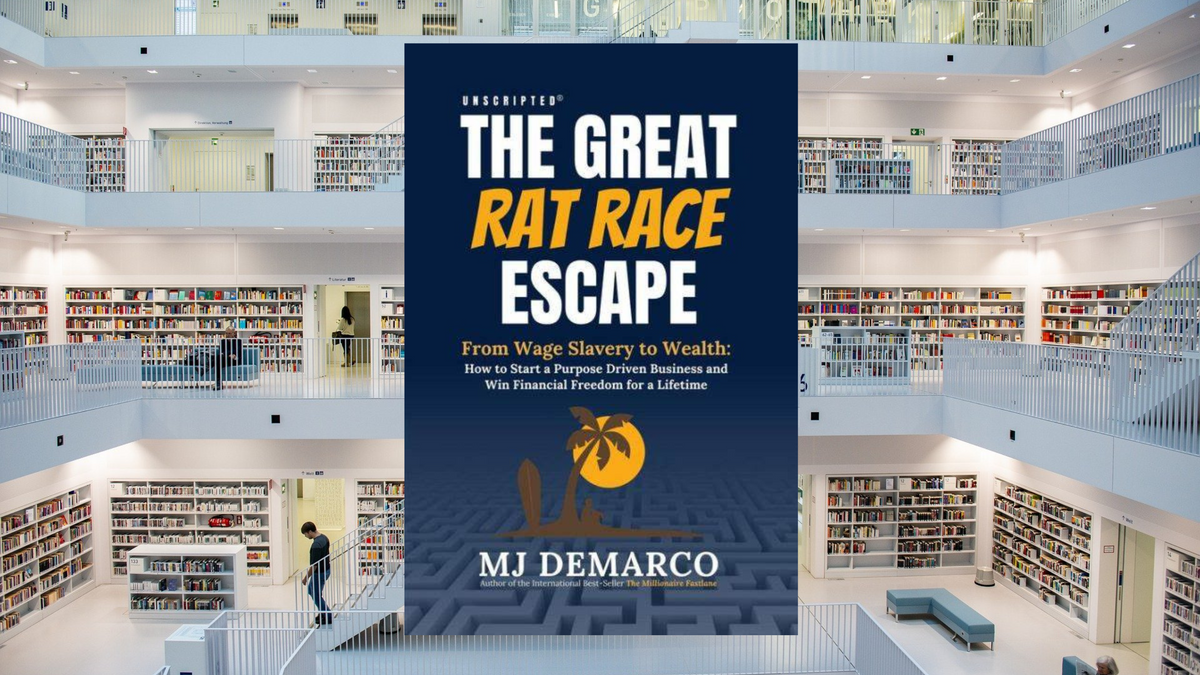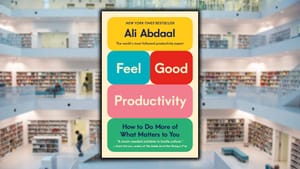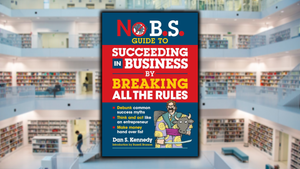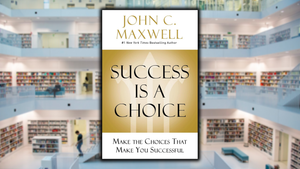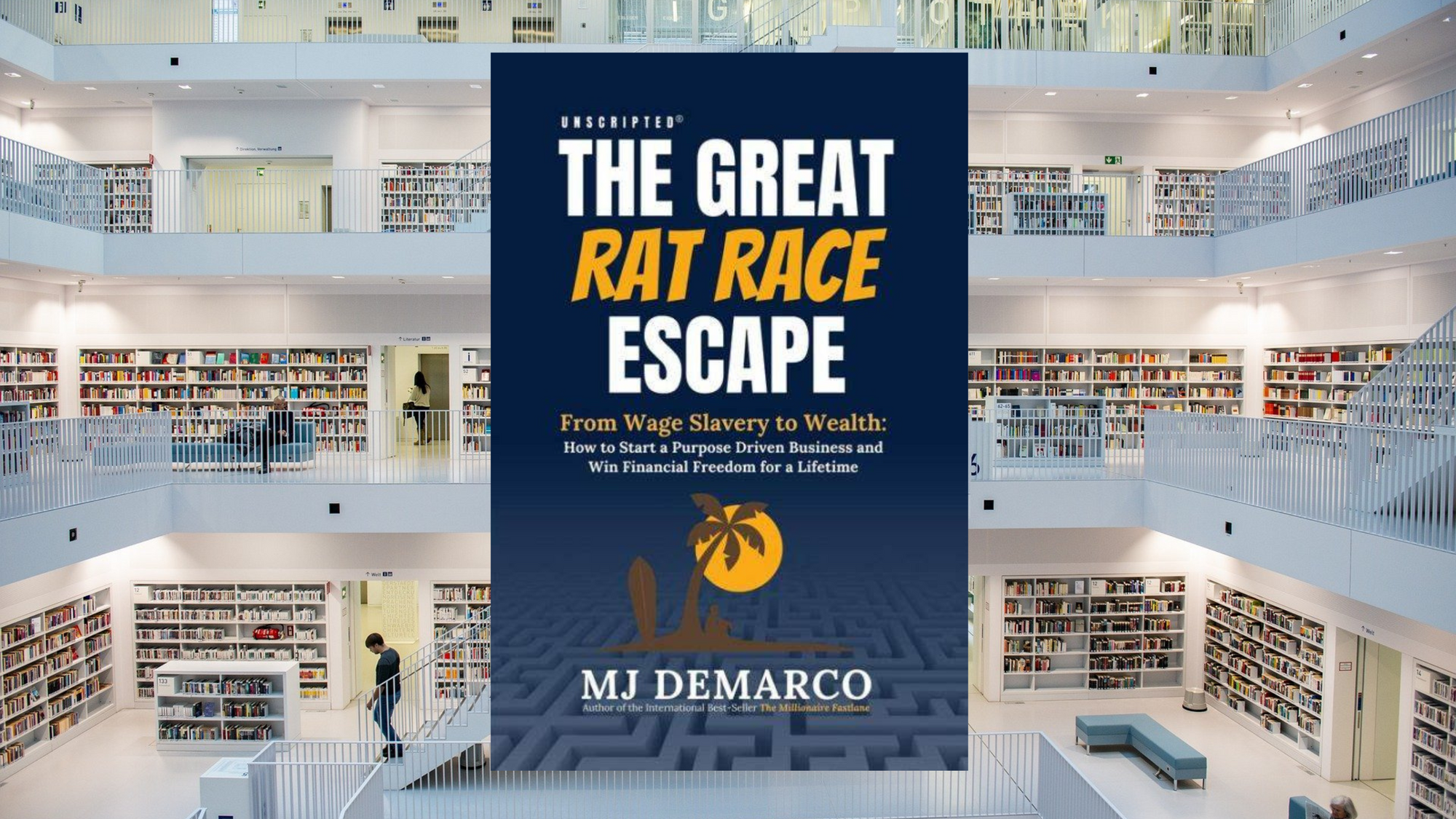
Summary:
An extraordinary life is won on offense and then preserved on defense. This book is about increasing your offensive capacity - and, specifically, about creating an income that will enable you to live free forever - while avoiding the mistakes and pitfalls that derail so many other well-intentioned people as they try to make a big move forward in life.
The Great Rat Race Escape blasphemes against the current “economic religion” of the world, which tries to convince people that they “wouldn’t be too unhappy” working away for 40+ years at a job that they “kinda-sorta like” (or, in many cases, passionately loathe), just so they can maybe - hopefully - get their freedom back fifty years later when they can finally enjoy their money from the safety of the nursing home.
That sounds like a waste of a perfectly joyous life to me, and M.J. DeMarco teaches how we can avoid that fate by starting a business and taking advantage of the internet gold rush that we’re currently experiencing. The creator economy is absolutely booming right now, new businesses are appearing all the time, entrepreneurship is “hot,” and our time is now.
That being said, one of the things I appreciate about DeMarco so much is that he refuses to peddle easy answers and impossible guarantees. He says right up front that starting a business will be the hardest thing you ever do, and growing it will be the second hardest thing you ever do. “Get rich quick” exists (even though it almost never, ever happens), but “get rich easy” almost certainly does not.
So, entrepreneurship is obviously not for everyone, and I would never try to tell anyone that there’s something “wrong” with working a regular 9-5 job for your entire life. Some regular jobs are profoundly fulfilling, beneficial to society, and totally necessary for society’s proper functioning. However, if that’s not for you, then there’s another way.
The starting point of your journey to freedom is to reorient your relationship to time. I don’t think I need to tell you that your time is the most valuable thing you’ll ever own, but you also need to realize how it’s often being used against you.
For example, when time is being used as a variable in the equation for your financial freedom, you’re being propagandized. If your investment advisor tells you that in 30 years you’ll have enough money to retire, you have to realize the full implication of that statement. In 30 years, you’ll be 30 years older! And you’ll never get that time back! Ever!
Yes, patience is a virtue when it comes to investing in the stock market, but if you notice, the only people getting rich quickly here are the people who have lots of money to invest already - like the people who sell you their investment products and coaching programs!
You’ll also notice that M.J. DeMarco has no coaching programs or anything like that to sell you whatsoever. You can get a world-class business education that you’d otherwise have to pay tens of thousands of dollars and years of your life for, all for less than the price of a meal at a decent restaurant. Now that’s a solid ROI! Books, man, I'm tellin' ya.
Time is also incredibly important when it comes to increasing your income. Simply put, there is a hard limit on the number of hours you can work in a day, but there is virtually no limit to how many products you can sell. Also, when you leverage the power of the internet, you’re “working” when you’re not even physically in the same room as your customer!
For example, surgeons only make money when they perform surgery, but surgeons who have written a book can put up that book on Amazon and it’ll continue to sell copies even while they’re in the O.R. performing surgery - or asleep, or on vacation, etc.
Or if they've created an online course about how to get into medical school, that course can sell online over and over again, without the surgeon/teacher ever having to be there when it happens. And of course the same goes for physical products, except you still have to deal with manufacturing, inventory, and all of that.
This was a revelation to me when I was in my twenties, looking to make a living doing what I love (writing), and wanting to escape a job that I increasingly began to hate. I experienced several of what DeMarco calls FTEs (“Fuck This” Events) while working as a nighttime security guard at a hospital, 4-5 nights a week, every week, while also working every weekend as a bouncer at a bar.
I remember sitting in my car one night after being sent from one hospital complex to another (as one of the only employees with a car, I was always being asked to cover for them, and I never had a choice over whether I’d accept or not) and reading The Millionaire Fastlane, DeMarco’s first book, thinking: I’m not going to do this for the rest of my life. I am going to do whatever it takes to change my situation, to gain the skills to succeed in this new internet age, and to use whatever talents I have to make people’s lives better with my writing. I was going to make it, no matter what, and I was going to listen to what this M.J. DeMarco character had to say. Maybe he could help.
Well, like M.J., I’m never going to tell you that it’s easy, and that “anyone can do it.” Making a big change is difficult, it’s a long, drawn-out process, and you have to keep showing up every single day. But with the right mentors (books can be mentors), the right mindset, the right work ethic, and the right pain to motivate you, there’s very little that’s going to be able to stop you.
Yes, I said pain. Mediocre comfort (television, getting drunk, working an “okay” job) is going to keep you chained to a mediocre existence. You have to want to change, more than you want to stay the same, more than you want to waste away living a smaller life than you’re capable of living.
Not everyone has to start a business, or be an “influencer” (whatever that is), or even be rich. But you build your life with your choices, and if you keep taking the easy way out, you’re going to stay where you are in your life. As they say: Easy choices, hard life. Hard choices, easy life. Suffer the pain of discipline now, or suffer the pain of regret later. I just combined two different sayings there, but you get the idea!
There's actually this story I found instructive, about a dog who’s sitting on a nail, who is obviously uncomfortable but is still remaining in place. When the owner is asked why the dog just lays there, the owner says, "I guess it just doesn't hurt enough to move.” The lesson is clear: You can either sit there, uncomfortable, unhappy, unfulfilled, but not “too uncomfortable,” or you can stand up and yank the nail out of your thigh and get to work.
This book is about what to do after you’ve made the decision to get to work - to make the shift from being a passive consumer to being an active creator. The Great Rat Race Escape is actually two books in one, a nonfiction business book containing timeless principles for wealth creation, and also a fictional story where those principles are put into action. In the book, Jeff and Samantha Trotman both live above their means, working jobs that are slowly killing them, and they’re desperate to figure out how to leave. Notice the presence of the FTE, by the way.
Here they are, racking up crippling debt with their Ferrari tastes on a Ford budget, facing an unplanned pregnancy, and staring down a mid-life crisis twenty years too early. Interspersed between the chapters of their story, DeMarco breaks down 120 wealth-building strategies and principles that the Trotmans will use to plan and execute their own rat race escape, and that can also be applied to your situation. I found almost every single one of them to be extraordinarily useful, and in retrospect, that’s obvious, because they are principles! They’re not fads or trends, but timeless principles for business success that are applicable in all sorts of situations.
A few of DeMarco’s ideas make his books worth reading dozens of times over. The first is about probability, and about how we are always stacking the odds either for or against ourselves. Starting and growing a business carries a ton of risk, of course, but you stack probability in your favor by getting started in the first place, seeking out mentors and role models, experimenting and trying to find out what works and what doesn’t, taking enough shots and trying again and again, and by applying the best ideas that the best business minds that have come before us have figured out and implemented in their own businesses. Doing all these things and more makes entrepreneurship less “risky,” and increases your chances of success.
Another idea is his CENTS framework, which you can use to determine if the probability gods are likely to shine upon you. The letters stand for Control, Entry, Need, Time, and Scale, and if you have all these factors on your side, then your business is much more likely to take off. If you don’t Control your business, or if there’s no barrier to Entry for your competitors, for example, then you’re in for a tough slog. More on this below.
Another spectacular idea is that of increasing your value to society by either scale or magnitude. Scale is also part of the CENTS framework, and it means that if you can get your product into the hands of more customers you’re going to do much better financially (obviously). But if you improve the lives of people at a greater magnitude as well, then you’re also rewarded extremely well financially.
You can make a million people’s lives a little tiny bit better and have them each pay you a dollar (say, for example, by producing a candy bar that many people enjoy), and/or you can create a ton of value for a smaller number of people.
Think, for example, about a doctor saving a person’s life. They may only be able to save one person at a time, but the magnitude of their contribution is massive, which is why they can command such a high premium for their services. I honestly can’t recommend DeMarco’s books highly enough, and if you’re at all entrepreneurially-minded, then they are absolute must-reads.
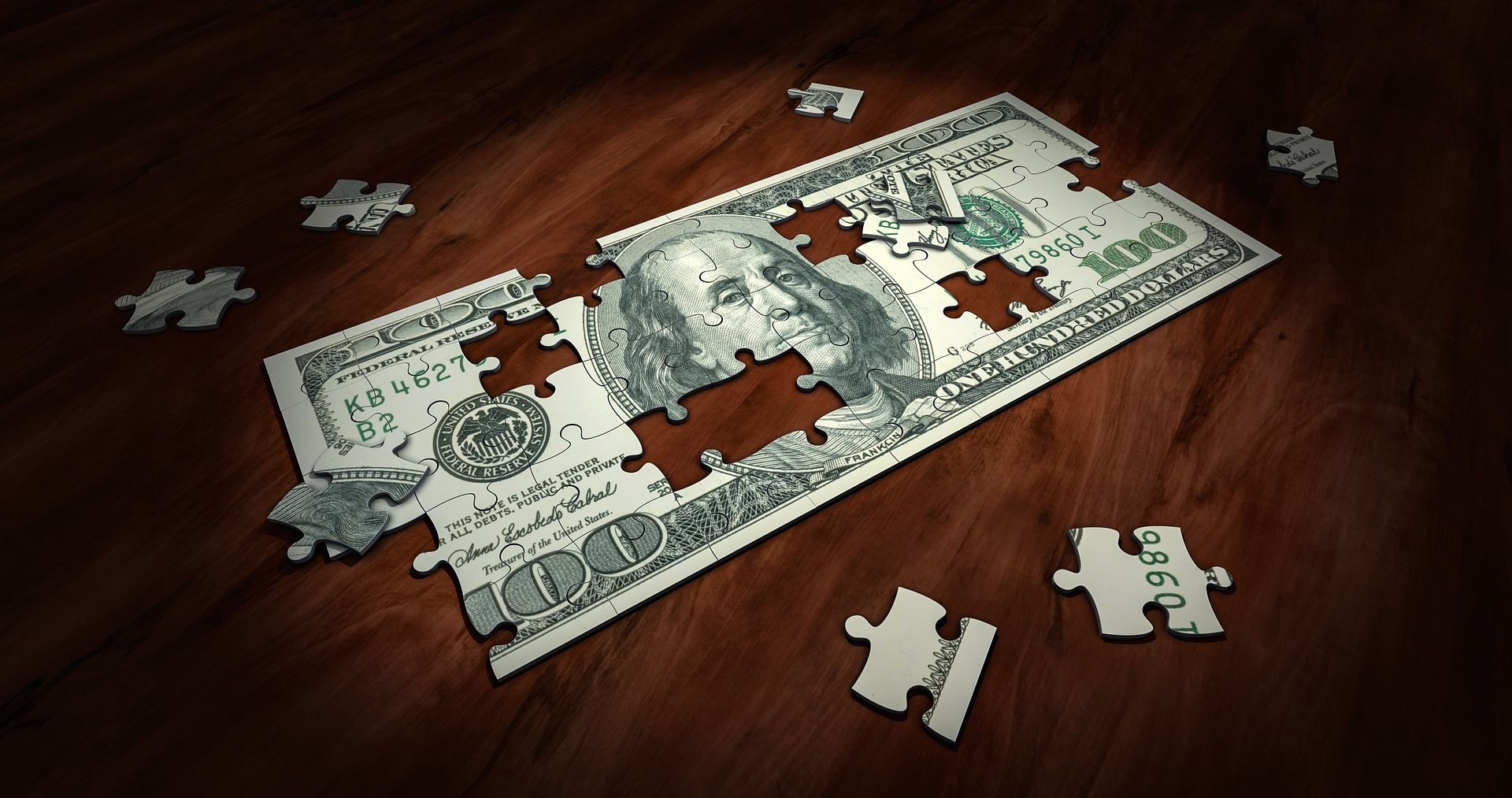
Key Ideas:
#1: “Starting a business will be the hardest thing you ever do. Growing it will be the second.”
Don't let anyone sell you any easy answers: there are few guarantees in business or in life, and becoming an entrepreneur is not a quick and easy path to fame and riches. Get ready to work, and to work hard, but also get ready for plenty of people to doubt you and not believe in you.
These same people may even love you and want the best for you, but to them, your entrepreneurial journey is just too different from anything they believe is possible - for them, but also for you.
A lot of the changes you'll have to make are going to be internal, and there are going to be people who just aren't aware of those changes that you're undergoing. They won't see the vision, they won't see the drive you possess, and for that reason, they may not believe you can do it.
None of that matters to you, though, the person who's out there doing it, and who's working hard every day to make it happen.
#2: “If the crowd knew any better, they wouldn’t be two paychecks from broke and wasting their life in front of a television.”
There's nothing wrong with watching TV, but you have to realize that once you decide to become an entrepreneur, the number of credible people you're going to be able to take advice from is going to shrink considerably.
Lots of people are broke, unsatisfied with their lives, and many of them are going to view your choices through the lens of their own circumstances. Don't take business advice from broke people, and don't take criticism from anyone you wouldn't take advice from.
#3: “Our culture thrives on mediocrity and obedience. It is the world’s business model.”
The larger society isn't interested in whether or not you make it or become financially successful. In fact, many companies have a vested interest in keeping you mediocre, obedient, and holding on to the illusion of freedom.
For example, Netflix doesn't want you to start a business, because that means you won't have time to watch their shows. McDonald's doesn't want you to stick with an exercise program, because your new healthy lifestyle is going to cut into their profits.
Other examples abound, but once you start to look for it, you'll notice that there are whole subsections of the economy that benefit financially from you being just like everybody else.
#4: “Give a man a tolerable job that pays just enough to provide mediocre comfort and I’ll show you a man that won’t change a damn thing.”
Here's a recurring theme in any kind of change effort: there has to be sufficient pain, or sufficient promise of future pleasure, to get you to change. That's it. Those are basically the only two motivators on the planet: pain and pleasure.
If you're not in enough pain, then you're not going to make a change. This goes for everything, but especially when deciding whether or not you're going to do whatever it takes to be successful in business. A "comfortable" life will never be a sufficient motivator for change.
So, you want at least some pain in your life. Use it for fuel. Use your pain and your discomfort and your dissatisfaction to motivate you, and to get you to choose success rather than stagnation.
#5: “If your financial freedom is dependent on something you can’t control, you’re not free.”
Nobody knows what makes the stock market go up and down. If you have a boss, they can fire you. If Instagram is your main source of clients, what happens when they change their algorithm without telling you?
In all these cases and more, your financial freedom is imperiled. Now, the stock market can be fantastic for long-term growth, and having a job absolutely provides security (up to a point). Where they become dangerous though is when you rely on them and nothing else for your freedom.
You would never try and sit on a chair that had only one leg, so why do you have only one source of income? Diversify as much as possible, and reduce the number of people in your life who can ruin your life with just one decision.
#6: “Whenever the rat race marginalizes time and treats it as a mathematical variable for financial freedom, you’re being propagandized.”
Too many financial experts treat time as though it were limitless. They say, "Stop buying $3 coffees for 40 years, and then you'll be rich!" But what if you can't wait that long? What if you love coffee? 40 years isn't "nothing." 40 years is an extraordinarily long time (in at least one meaningful sense); a lot can change in that time.
Depriving yourself of happiness and enjoyment now for the promise of freedom in the future that may never arrive doesn't serve your interests; it serves the interests of financial advisors who earn fees for giving their advice.
#7: “Ten years is a lot of time for radical accomplishment.”
Even if you're over forty (which honestly isn't that old anymore), you've still got plenty of time. If you start today and put ten years into mastering what you do and creating something valuable that people will pay you for, you're only going to be fifty when you're done. That's assuming it takes you the whole ten years, which, if you're working on your dreams every day, is probably more than enough time.
You're going to get older anyway, so if there's something - anything - that you want to bring into your life in the future, start today. Start now!
#8: “Live within your means with the intent to expand your means.”
Spending money to show people how much money you have is the fastest way to have less money. Moreover, the only thing you know for sure about a person who's driving a $100,000 car is that they have $100,000 less than they used to! It's all flash, no substance, and if they're in debt up to their eyeballs just to maintain that image of fake success, then they're not someone whose example you want to follow anyway.
Instead of all that, reduce your living expenses and get by with less. This does at least two things. One, it lets you realize (and trains you) to be happy with less. Many people think they need all this stuff around them in order to be happy, but once you willingly deprive yourself of it, you realize that it wasn't all that important in the first place.
Second, and more importantly in terms of launching your business, living within your means gives you extra rocket fuel that you can pour on your dreams. Move into a $1,000/month apartment rather than $2,000 one and you have an extra $1,000 every single month to spend on multiplying the effectiveness of your time, marketing your services, and growing your business.
It's perfectly okay to want to buy things and add stuff to your life, even unnecessary things, but the intelligent approach is to live within your means first, prove to yourself that you can do it, and then expand outward from there.
#9: “When a gazillion people can do what you do, you have no leverage.”
Professional athletes command such high salaries partly because there are so few people who can do what they do. Conversely, someone working at a car wash is replaceable with almost anyone, which means they don't get paid nearly as much.
Again, I always stress the fact that there's nothing wrong with working at a car wash - and never let anyone tell you otherwise - but just realize that you're handicapping your earning power by not possessing skills that are rare and hence more valuable.
#10: “Anything that can be improved is a business opportunity.”
You don't need to invent the next Facebook in order to make a million dollars. Successful businesses are launched every day that simply address an unmet need in the marketplace, and improve on something that already exists.
So don't say that you don't have any business ideas! If you say you can't find any ideas for a business you can start, you're basically saying that the world is perfect and needs nothing. Something can always be improved. Maybe your service is faster, cheaper, friendlier, more environmentally sustainable, etc. Find something that people are dissatisfied with and something that you could make better, and you've found an idea for your next business.
#11: “Change, and adaptation to it, is what creates millionaires and billionaires.”
Every time there's a massive change in the way people live, move, connect, communicate, or create, there's a massive opportunity to earn a profit by facilitating that change.
In the railroad era, businesses that existed along major rail lines saw massive upticks in business, not to mention the wide array of new businesses and careers that were made possible by the emergence of the railroads themselves. Many of the people who got in on those changes became very, very wealthy.
Today, with cryptocurrencies, there are dozens of ways to make money and facilitate the change in the way we pay for goods and services, arrange contracts, and establish digital ownership. Putting yourself in the way of that change could change your entire financial trajectory.
Those are just two examples, but look for any area or industry that's experiencing massive, fundamental change, and you're not going to look far to get an idea for a business. Space travel and space exploration is another area that's going to open up in the next few decades. Be there, help people adapt to change, and you'll be in a perfect position to profit from it.
#12: The CENTS framework that will help determine whether your business has solid fundamentals:
Control – You have full control over your business and you aren’t in danger of losing everything because someone else made a decision that you can’t control.
Entry – It’s too difficult for someone else to enter the market with a similar product or service and compete with you.
Need – Your product or service is something that fulfills a genuine need that exists in the marketplace.
Time – Your profit is divorced from your time so that you don’t physically have to be there when your product or service is sold or generates money.
Scale – Your product or service has no marginal cost of reproduction, meaning that it’s easy and cheap to make more of what you’re selling without you having to put time and money into inventory or creation.
#13: “You can worry about the millions after the hundreds.”
We call these "Ferrari problems." They're when you've started shopping for a new sports car before you've even registered your business or bought a domain name. After you acquire your first customer, you can work on how you're going to acquire the next one, but don't start sketching out possible Super Bowl ads you can run for your business before you've laid the fundamentals. Even then, you still have to focus on the fundamentals or you'll run off track. Think small to go big.
#14: “Never live within the parameters of someone else’s opinion unless you want to live within the parameters of their existence.”
If someone isn't willing to die your death for you, don't let them plan out your life. As we've talked about, there are going to be plenty of people who aren't able to see your vision, and even some who are going to actively try to take you down. Don't even think about them if it takes your focus off your dream. Block them out and capture it.
Again, don't take criticism from anyone you wouldn't take advice from, and don't take life advice from anyone whose life you wouldn't want to live.
#15: “Your idea sucks until execution says it doesn’t.”
Ideas are cheap, execution is rare and valuable. Don't worry about anyone stealing your ideas, because they're worthless unless they're acted upon. And you may have a fantastic idea for a business that could generate millions in revenue for you over time, but if you don't take action, your idea doesn't matter.
#16: A word on targeting huge markets: “If you’re dropping a nuclear bomb, you don’t need a bullseye.” Meaning, you don't have to get everything in your business absolutely perfect if there's a big enough market for what you're selling and if your product is "good enough."
Yes, improve your offering over time, but it's execution on ideas that's most valuable. Your messaging may not be perfectly effective, your website might be a bit slow, or any number of other things that could be improved, but if you're selling bottles of water in the desert, you're going to make money.
Alright, so maybe you don't need a website to sell water in the desert, but you get the idea! If there's a big enough demand for what you're selling, just get your product to market and then iterate from there.
#17: Hack probability by stacking the odds in your favor and giving yourself more chances to win, thus giving the appearance of luck. Everything in life operates according to probabilities, and the more probabilities you have working in your favor, the better your performance will be.
For example, it's not luck that makes someone attractive to potential dates. There are certain characteristics that many people look for when choosing whom to date, and if you develop more of those characteristics, you're going to be more attractive.
As you become more emotionally stable, more people are going to find you attractive. As you become more financially stable, more people are going to find you attractive. As you stack these probabilities in your favor, you're increasing the chances that any one person you approach for a date is going to say yes.
Well, it's the same when attracting a customer or running a successful business. The more "characteristics" your business has in its favor - low price, great service, valuable product, solid marketing, etc. - the higher the odds that your dream customer will buy.
#18: “Start looking at people as if you were a backseat passenger in their car.”
The people you take with you on your entrepreneurial journey are going to affect the outcomes you experience, and this is true in every domain of life. If you're the average of the five people you spend the most time with, anyone who's dragging you down to the level of their drama, instability, and insanity are going to have to be jettisoned for you to experience the success that you seek.
Think of it like getting in a car with this person. Would you get in the back seat of a car with someone who's had 25 drinks? Or someone who consistently ignores the posted speed limit and endangers the lives of pedestrians? The whole bundle of this person's personality traits, objectives in life, and general attitude make up the "car" that they're driving, and if you don't like where it's going or how fast it's getting there, don't get in.
#19: “One event lasting minutes can destroy a process that took years to build, but the reverse does not apply.”
Think of all the things that could happen to you today that would make your life much better. Now think of the number of things that could happen today that would make your life much worse. The second list is much longer, right?
Similarly, your reputation can be ruined in an instant, but it takes years to build. So beware of "downside asymmetric risk events" or DARES, and make sure you act with integrity, good grace, and dignity as you move forward in your entrepreneurial journey.
Your hard work can be wasted with just a few bad decisions, but your success can't be achieved instantaneously. Don't be so scared that you never make a move forward in belief, but also understand that actions come with consequences - and probabilities.

Book Notes:
“It’s no mistake that you are schooled Monday through Friday for eighteen years just so you can work Monday through Friday for the next fifty.”
“If confiscating 100 percent of your economic output makes slavery, at what point does it stop being slavery? 80 percent? 50 percent? 39.6 percent?”
“Offence wins the game in ten years or less, defence preserves it for the next fifty.”
Ten years is not an unreasonable timeline to build a successful business, and then sell it to finance your retirement. We've all heard of tech startups being sold for millions mere months after going to market.
But if you don't preserve your wealth, it has a tendency to run away from you. That's why most pro athletes go broke after their playing careers are over; they don't know how to spend and save money, and so they lose it all. Don't let that happen to you! Not after all that work you put in during those first lean years!
“Even in respectable, good-paying professions, saving $5 million at a 10% savings rate would take centuries.”
Saving your way to wealth doesn't work - not if you think you're going to have higher living expenses. Even if you made $100,000 a year and were able to save 10% of it each year, it would take you 500 years to save your way to $5 million. You need to start a business.
“Timing, curiosity, and bribery are three ways to get someone to read a book they don’t want to read.”
Less than one percent of the words in Michael Phelps’s Wikipedia entry are about the disciplined process he underwent in order to win. Everyone wants to focus on the flashy stuff - the medals, the wins, the highs - but talking about how determined and disciplined and hard-working he was doesn't sell magazines, so hardly anyone ever talks about it.
“It’s shamefully comical: the secret to success is no secret, it just never finds a headline.”
“Entrepreneurs solve big problems and offer their solutions for profit.”
“The largest industry in the world is the business of shortcuts.”
Easy is crowded. Everyone is trying to do what's easy, what will take the least time, what's faster and simpler. This is your opportunity to outwork them and leave them behind. As they say, it's never crowded along the extra mile.
“Because change is constant, so is opportunity!”
“To take advantage of change and the ever-growing knowledge gap, the best tool I’ve found is a PESTLE analysis. PESTLE is a textbook strategic model that can help you identify changes, opportunities, or threats to any business:
Political – What political dynamics are likely to affect the business?
Economic – What supply and demand considerations will likely affect the business?
Sociological – What cultural shifts and/or tastes are likely to affect the business?
Technological – What technological changes (or disruptions) might affect the business?
Legal – What current or future legislation could affect the business?
Environmental – What environmental shifts or trends might affect the business?
Answer these questions and external changes won’t be a threat, they will be an opportunity.”
“Are the rules you’re following evidence-based?”
“At the end of the day, your career as an entrepreneur also needs to be a career in marketing.”
“Any time you engage the world, you set yourself up to spot ideas.”
A great idea with poor execution isn’t going to be worth anything. Similarly, even a half-decent idea but with great execution is going to be worth far more. You can put this into a chart too, where a great idea is “worth” $100, and poor execution is “worth” $1. Put those together, and you get $100. But if a poor idea is worth $1 and great execution is worth $1,000,000 and you put those together, then you’re going to come up with a potential value of $1,000,000. Execution is a multiplier, where the potential value of your idea depends on the power of your execution.
“Your idea is like a multiplier, while execution is where the money goes asymmetrical.”
“A mediocre idea with great execution could be worth tens of millions.”
“Decent execution in a large TAM (Total Addressable Market) opportunity might change your life – decent execution in a small opportunity might pay your bills.”
“Make choices that give you the mathematical edge.”
“Probability exists, even though you can’t see it.”
“Better choices give you better probabilities.”
Start backward from the ideal customer experience and identify every problem you’ll have to solve in order to provide that experience.
“Feeding an appetite doesn’t require you to share the same hunger. One who sells a bottle of water doesn’t need to be thirsty himself.”
This basically means that you don't have to like sushi to start a sushi restaurant, or enjoy gambling to open a casino. You don't have to be passionate about the product or service you provide in order to make an excellent product or deliver an excellent service.
“A trend’s utility-value and its cultural support will determine whether a trend is expiring or a valid consumer shift that is worthy of investment.”
Don't start a business in a sector that won't exist in the future. You wouldn't invest in horses once cars started to catch on, because you would have been able to see that cars were useful (had a high utility-value), and received lots of cultural support (had become status symbols and the subject of desire).
“Everything you could possibly want to know is out there. You just need to know how to search for it.”
“Your problem defines your next course of action.”
This goes for choosing which books to read too. Decide what your most urgent problem is, and then find a book that will help you to solve that same problem. Likewise, if there's a problem in your business that's important enough to solve right now, then you've just discovered your next logical course of action.
“The correct course of action is the shortest path to your first customer.”
Don't spend too much time designing and redesigning your website, switching the color of your branding, and other such things. The very next action you should take is the very next thing that will close the gap between where you are right now and that first customer signing on the dotted line.
Ask, “Does this action get you closer to your first customer?”
“What you know today is never enough for the problems of tomorrow.”
‘Ferrari shopping’ is focusing on a distant problem instead of the problem that's right in front of you. First thing's first!
“In all cases of future excellence, it was earned in the past through a disciplined process in pursuit of exceptionalism.”
“If you’re not seeking the truth, you’re not getting the truth.”
“Winning formulas aren’t a secret. They’re advertised in broad daylight for all to see. Look at the best, observe, reverse engineer and model.”
“Whenever your mind dwells in the past or future, the joy of Now is lost.”
“Don’t wait to be happy; choose to be happy.”
“Once I escaped my expensive sports car blunder, I started saving money from the standpoint of raising a financial army. I knew that every dollar I saved was another soldier fighting for my freedom. Even in today’s low-interest economy, out of every 100 pennies saved to your financial battalion, three to six procreate yearly. Accumulate enough soldiers and the compounding weapon ignites. Instead of enjoying six cents per year, it’s $60,000.”
“Every dollar you save today is one dollar you won’t need to earn tomorrow.”
“If you need a loan to afford it, you can’t afford it.”
“Time favors NOW over LATER, just like money. Money and free time enjoyed today are far better than ten years from now.”
“Always make big financial decisions through the prism of time, trouble, and taxes.”
Will this decision lead to the erosion of your free time? Is it worth all the extra trouble that the consequences of this decision may bring into your life? Are you going to have to pay taxes on it?
“Many people caught in today’s modern economic religion are faced with the same reality. They’re empty souls on a treadmill of time, aging in indifference, consuming in hope, saving in anticipation, and dying in regret: no hope, no future, and no chance of anything changing but years on a calendar.
The thread that binds them all is a dead dream. Dead dreams are why everyone is miserable and counting down the seconds to the weekend. Dead dreams are how people stay miserably stuck in the same dismal pattern: work, pay bills, consume, and then repeat.
In fact, addiction has been weaponized to medicate misery, from the smartphone glued to our faces to the junk food spiked with sugar to the dopamine manipulating video games packed with reinforcement heuristics to the TV programs and sporting events that fill our empty lives with meaning. Unhappiness – dead dreams – is the business model of the modern world.”
“Whatever you’re doing, approach it with these three things in mind: 1) effort, 2) pride, and 3) optimism. Do it as if it were your own. I don’t care if you’re driving for Lyft, waiting tables, or shoveling horse manure; give it the best you have, do it well, and know you’re grinding coal to make a diamond. What you do does not make you, but how you do it. If you’re a great dishwasher now, I’ll bet you’ll be a great surgeon later.”
“Thank you for reading. I wish you good probability and much happiness. Now is the time for it to happen.”

Action Steps:
So you've finished reading the book. What do you do now?
#1: Identify where you're unfree.
Before you can escape from prison, you have to realize that you're in one. Today, many people's prisons have ultra-soft bars - Netflix, a monthly salary, etc. - but they are still deadly to personal freedom.
When your entire livelihood can be destroyed by the decision of one person ("You're fired!"), or when you're at the mercy of forces you can't control (your emotions, global trends, randomness), you're not free.
Of course, we don't control the weather and we don't control other people, but to the extent possible, try not to have too many people in your life who can ruin you with one decision. And once you realize that jobs aren't safe anymore (they never were), you can take the steps necessary to secure your own freedom.
#2: Calculate how much your dreams actually cost.
So many people seem to think that they need to be ultra-wealthy to live the life of their dreams. We've all seen the video clip of Bill Gates being totally unaware of what regular, everyday items in the grocery store cost, but, in exactly the same way, more ordinary individuals think that luxury has to be expensive.
In actual fact, when you do the calculations yourself, a spectacular life doesn't have to cost you tens of millions of dollars. It goes without saying that you don't technically need any of these things in your life at all, but if you do want them for some reason, let's do some simple math:
*Renting a $5,000/month apartment = $60,000/year
*Payments on a Ferrari = $60,000/year
*Monthly vacations anywhere in the world = $120,000/year
*Expensive brand-name clothes = $10,000/year
*Eating at the best restaurants every weekend = $52,000/year
Grand Total: $302,000/year
Are you surprised? Granted, that's still a ton of money for most people, but it's not even a third of a million dollars, and here you've got the absolute best of everything in a bunch of different categories. I still don't think you need any of that stuff anyway, but if you did want it, you just need to figure out how to make $25,000/month.
#3: Amplify your own pain.
Comfortable people will never be motivated enough to make a change in their lives. If you're just "kinda okay" with where you're at, you're pretty much going to stay there. So what do you do if you want to get motivated?
Look for the pain points in your life and think about how much you would regret never doing anything about them. Imagine getting to the end of your life and realizing that you could have been 10x happier if you had only had the courage to make a change!
So regret can be a powerful pain point - or, rather, imagining the pain of future regret - but you can also just take the worst part of your current situation and realize how much you just fucking hate it. Realize how much you hate your boss, your snooty co-workers, the low pay, the long, boring commute, and the lack of free time and energy when you're done working your life away at some insecure job.
Imagine doing that for forty years! Imagine that that's what your one and only life is going to be about! Are you really okay with that? If you're not, tap into that pain that you feel and use it to fuel your forward progress.
#4: Identify where you can free up your money.
A major advantage in business is having the money to pursue opportunities. While other entrepreneurs feel the need to make all this money to fund their expensive lifestyles, you can give yourself a massive edge by reducing your living expenses and funneling it all into your business.
Every $100 that you save here and there is $100 that can go towards Facebook ads to grow your business, towards designers to make your products stand out, to fuel your business's growth.
If you can get to the point where you don't need money and your competitor does, you win. They're stressing about how they're going to make payments on that second house they never visit, while you have the focus and the budget to take away their market share and grow your business.
#5: Identify 3 future trends.
Change makes millionaires and billionaires, so observe the current cultural landscape and look for opportunities to facilitate that change. Doing so will put you in the way of massive profits and massive potential.
Beware of fads that come and go, but if you identify a trend, something that's likely to endure and spread, you can usually pick out business opportunities that go along with that quite easily.
So push yourself to identify three major trends that are spreading through the world today and see if you spot any underserved or untapped markets.
#6: Engage with the world and find out what's wrong with it.
Armchair philosophers don't tend to be able to spot business opportunities. You need to get outside of your own head and your own routine in order to find out what problems are being faced by real people and discover ways in which you can help.
People everywhere are paid to solve problems, and if you provide the solution to problems that you encounter, you will be paid for your service. The trick is to identify problems that enough people are facing, and problems that you are uniquely qualified to help solve.
#7: Develop a leveraged skill.
If anyone can be trained to replace you, you're not free. There's very little barrier to entry to starting a blog, so most blogs don't make that much money. But if you develop the skills of being a good writer, a good businessperson, an entertaining speaker, a good video editor, etc., then you can stand out from the crowd and make good money.
So pick 1-3 things that you can become very, very good at, and separate yourself from the competition. Scott Adams, the creator of the Dilbert comic strip, has said that he's a pretty good artist, but that there are plenty of artists with more talent than he has. He's also pretty funny, but there are plenty of people who are funnier than he is too. However, he combined those two skills together, and now he's one of the most successful cartoonists of all time.
#8: Identify 3 value-skews you can bring to the market.
Likewise, if you're starting a food truck business that's just the same as every other one of the 50+ food trucks competing for the same customers in the same area, you're going to struggle. Maybe your food truck has a more colorful design, better reviews, plays better music, has friendly (and cleaner) cooks, etc. These are all value-skews.
So you want to always be looking for ways to skew value. For example, I noticed that most book summaries are boring and lifeless, so I make sure to inject my personality into mine. That's a value skew. If people want a refund, I don't make it difficult for them, I just give it to them. I don't try and scam people, and believe it or not, that's a value skew! Who knew just being honest could help you succeed customer expectations! What a world we live in.
#9: Run your business idea through the CENTS framework.
Quick reminder here, the CENTS framework will help you analyze whether you have a sustainable, profitable business model that can help launch you to wealth. Here it is again:
Control – You have full control over your business and you aren’t in danger of losing everything because someone else made a decision that you can’t control.
Entry – It’s too difficult for someone else to enter the market with a similar product or service and compete with you.
Need – Your product or service is something that fulfills a genuine need that exists in the marketplace.
Time – Your profit is divorced from your time so that you don’t physically have to be there when your product or service is sold or generates money.
Scale – Your product or service has no marginal cost of reproduction, meaning that it’s easy and cheap to make more of what you’re selling without you having to put time and money into inventory or creation.
So for every business idea that you have, make sure to test it against every single one of these criteria and see if it measures up. If no one wants what you're selling, it violates the commandment of NEED, and will likely fail.
Likewise, if you're only serving a few customers and one of them can reduce your revenue 50% just because they decide to go with another provider. Then you're violating the commandment of CONTROL. The more boxes you can check here, the better a business idea it is.
#10: Map out the shortest path to your first paying customer.
When you don't have any customers yet, your only priority is getting that first one. That's all you need to focus on. Everything else is a giant, flashy distraction. Once you have people actually opening their wallets and paying you for a product or service that you provide to them, then you can start thinking about whether the color blue works with your branding or not.
So, first, map out the exact process you're going to follow in order to make that first sale. How are you going to find that customer? How are they going to find you? What are you going to sell them and where? What will you use to get in touch with them? Email? Phone? Is your sales page confusing? Is your order form set up? Map these things out first and close that first sale.
#11: Stack the probabilities in your favor.
Life operates according to probabilities. Luck doesn't exist, but probability absolutely does, even if you can't always see it. Since everything in life is attached to probability, you can make success more likely by doing things that move the numbers in your favor.
By writing more articles, you increase the probability that more people will find them. By eliminating bad influences from your life, you increase the probability that the people around you uplift you. By exercising regularly, you increase the probability that you'll live a longer, healthier life.
There are all sorts of ways to stack the probabilities in your favor, and if you're consistently doing things that tip the balance towards success, you're eventually going to get there. Probably sooner than you think.

About the Author:
Entrepreneur, author, and the revolutionary “get rich slow” anti-guru, MJ DeMarco not long ago lived with his mother, mopped floors, and sought the dream like so many others: the dream to live free from bosses, free from 9-5 jobs, and free from life mediocrity.
Through rigorous years of self-study, countless errors, and failures, MJ uncovered the real essence of wealth, dreams, and was able to retire YOUNG in his thirties without sacrificing his lifestyle. (Yes, he drinks Starbucks coffee, drives exotic cars, and rarely clips coupons! OMG!) He lives in beautiful Phoenix Arizona and enjoys traveling, dining, writing, softball, working out, and obviously, has a fanatical passion for the Lamborghini marque. Rumor has it, he doesn’t own a suit, nor a tie.
Additional Resources:
The Fastlane Entrepreneur Forum
This Book on Amazon:
The Great Rat Race Escape, by M.J. DeMarco
If You Liked This Book:
The Millionaire Fastlane, by M.J. DeMarco
The Psychology of Money, by Morgan Housel
How to Fail at Almost Everything and Still Win Big, by Scott Adams
The Slight Edge, by Jeff Olson
